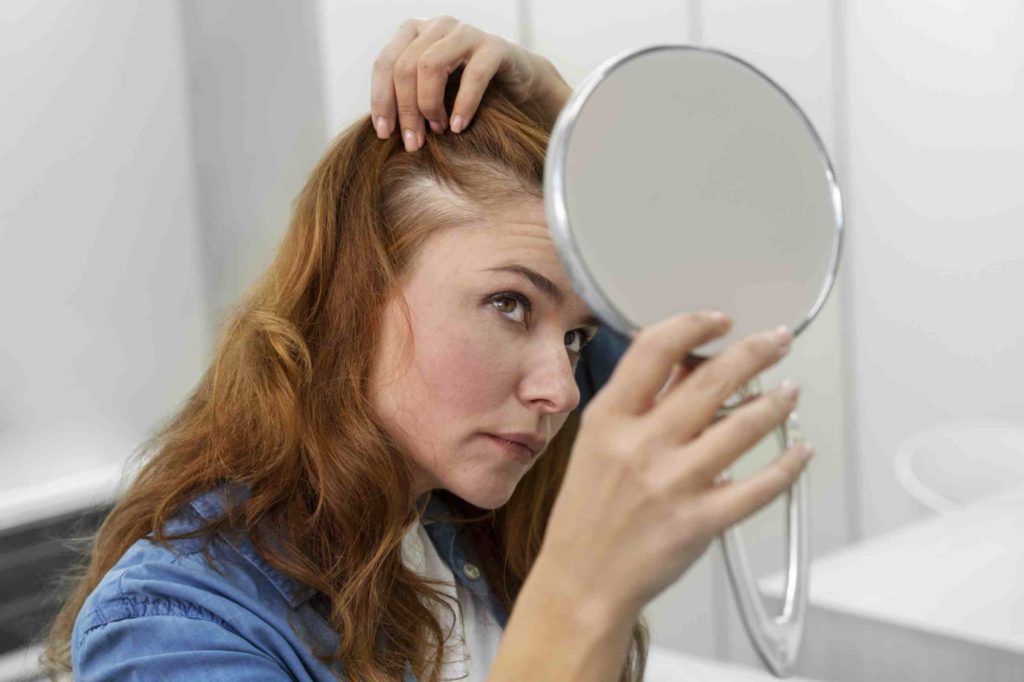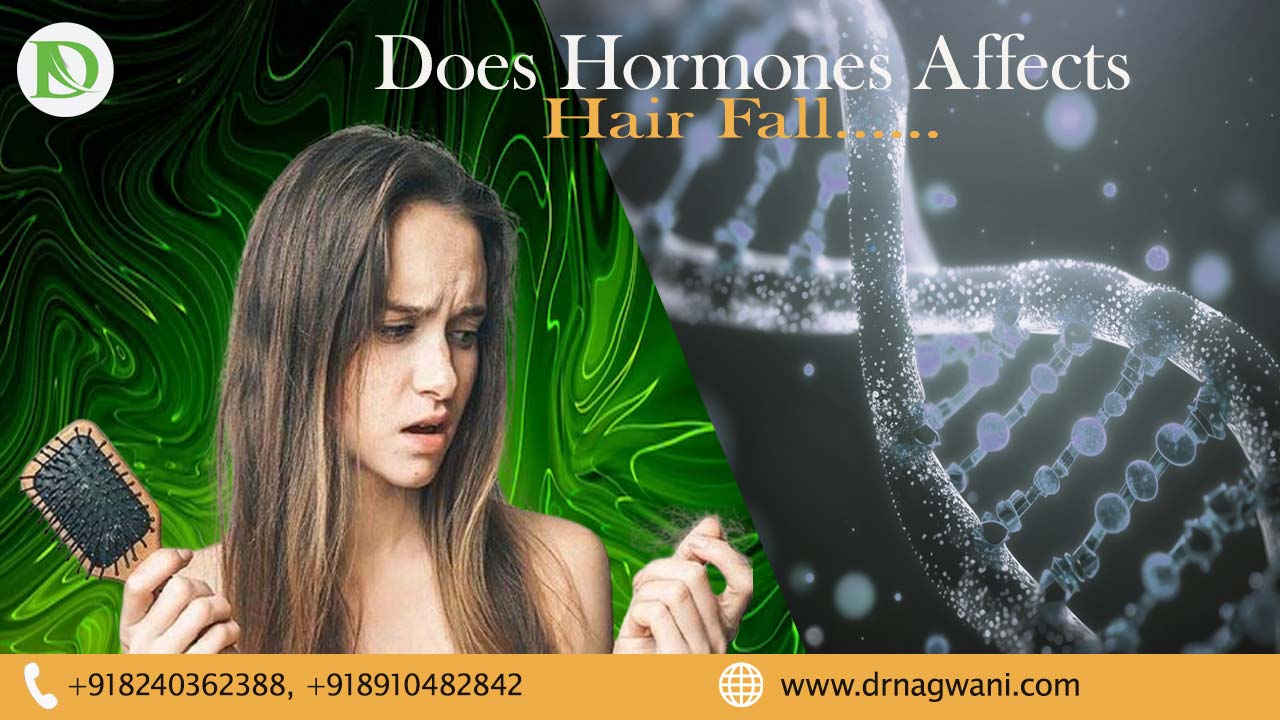Table of Contents
Unlocking hormones affects hair fall
In this comprehensive guide, we unravel the intricate relationship between hormones and hair fall. Beginning with an exploration of the hair growth cycle, we delve into the pivotal role hormones play in maintaining healthy locks. Sections such as “Estrogen and Its Impact on Hair” and “Testosterone and DHT: Culprits of Hair Loss” provide in-depth insights. Discover natural remedies, debunk myths, and explore medical interventions. Empower yourself to balance hormones for a resilient mane.
Understanding the Hair Growth Cycle
Before we explore the hormones affects on hair fall, let’s grasp the basics of the hair growth cycle. Hair goes through periods of development, rest, and shedding. Various factors influence this cycle, determining the quality and quantity of hair.
Role of Hormones in Hair Health
The role of hormones in hair health is pivotal, as these biochemical messengers significantly influence the intricate processes of the hair growth cycle. Androgens, a group of hormones, take center stage in regulating the growth and fall of hair. Their delicate balance is crucial for maintaining healthy follicles. Any disruption, whether through fluctuations or imbalances, can lead to conditions like hair loss. Understanding this hormonal interplay is essential for comprehending the root causes of hair health issues and implementing effective strategies for prevention and restoration.

The Link Between Hormones and Hair Fall
The Link Between Hormones and Hair Fall” delves into the intricate relationship between hormonal imbalances and excessive hair shedding. This section explores how conditions like polycystic ovary syndrome (PCOS) and hormonal fluctuations disrupt the natural hair growth cycle, leading to increased hair fall. By unraveling these connections, readers gain insight into the root causes of hair loss associated with hormonal changes, fostering a deeper understanding of the complex interplay between hormones and the health of our locks.
Estrogen and Its Impact on Hair
Estrogen, a key female sex hormone, significantly influences hair health. It acts as a guardian of lush locks, promoting thickness and shine. Optimal estrogen levels contribute to a robust hair growth cycle. However, fluctuations, particularly during pregnancy, menopause, or hormonal therapies, can lead to noticeable changes in hair texture and volume. Understanding the delicate balance of estrogen in the body is crucial for addressing and managing these shifts, ensuring a healthier and more vibrant mane.
Testosterone and DHT: Culprits of Hair Loss
Testosterone and its derivative, dihydrotestosterone (DHT), emerge as notorious culprits in the realm of hair loss. Elevated levels of DHT can shrink hair follicles, leading to finer and shorter hair growth. This process, known as miniaturization, gradually weakens follicles, ultimately causing hair loss. Understanding the influence of these hormones on the hair follicles is crucial in addressing the root cause of hair loss and exploring effective interventions to counteract their detrimental effects on hair health.
Thyroid Hormones and Hair
The thyroid, a vital gland in the endocrine system, profoundly influences hair health. Thyroid hormones, including thyroxine (T4) and triiodothyronine (T3), play a pivotal role in the regulation of the hair growth cycle. An imbalance, whether hypothyroidism or hyperthyroidism, can disrupt this cycle, leading to hair thinning and increased shedding. Maintaining thyroid function is crucial for preserving the vibrancy and thickness of hair. Individuals experiencing unusual hair changes should consider thyroid health as a potential factor and consult with a healthcare professional for thorough evaluation and guidance.
Cortisol and Stress-Induced Hair Fall
Cortisol and Stress-Induced Hair Fall”: When stress strikes, the body releases cortisol, a hormone that, when chronically elevated, disrupts the delicate balance of hair growth. Excessive cortisol can push hair follicles into the resting phase, leading to increased shedding and thinning. The impact of stress on hair health is profound, making stress management crucial for maintaining a full and healthy mane. Understanding this connection sheds light on the importance of incorporating stress-reducing practices into our lives to safeguard the vibrancy and resilience of our hair.
Puberty, Pregnancy, and Menopause: Hormonal Milestones
Puberty, pregnancy, and menopause represent pivotal hormonal milestones in a person’s life. During puberty, surges in sex hormones trigger various physical changes, including those affecting hair. Pregnancy brings unique hormonal shifts, impacting hair thickness and texture. Menopause, the cessation of menstrual cycles, involves a decline in estrogen, contributing to hair thinning. Understanding these milestones is crucial for managing the associated hormonal fluctuations and their effects on hair health. Balancing hormones during these stages supports individuals in maintaining a vibrant and resilient mane throughout these significant life transitions.
Nutrition and Hormonal Balance
In the realm of maintaining hormonal equilibrium, the role of nutrition is paramount. A well-balanced diet, rich in essential vitamins, minerals, and proteins, acts as a cornerstone for promoting hormonal balance. These nutrients play a vital role in supporting the body’s hormonal functions, directly influencing the health and vitality of your hair. Embracing a nutritional approach not only nourishes the body but also contributes significantly to the prevention of hormonal imbalances that may lead to hair fall.
Lifestyle Habits for Hormonal Harmony
Maintaining hormonal harmony involves cultivating lifestyle habits that positively impact overall well-being and hair health. Adequate sleep, regular exercise, and effective stress management play pivotal roles. Quality sleep supports hormonal balance, exercise promotes circulation for healthier hair follicles, and stress management reduces cortisol levels, preventing hormone imbalances that contribute to hair fall. Integrating these habits into daily life not only enhances overall health but also fosters an environment conducive to maintaining vibrant and resilient locks.
Medical Interventions for Hormonal Hair Fall
Medical interventions for hormonal hair fall encompass a range of treatments tailored to address the root causes. Hormonal therapy, involving medications that regulate hormone levels, is a common approach. Additionally, advanced procedures like hair transplants may be considered for restoring lost hair. It’s essential to consult with a healthcare professional to determine the most suitable intervention based on individual needs. These interventions offer effective solutions for those seeking to counteract hormonal imbalances and regain a fuller, healthier head of hair.
Natural Remedies for Hormonal Hair Fall
Discover the power of nature in combating hormonal hair fall. Herbal supplements and lifestyle adjustments offer holistic solutions to balance hormones naturally. Incorporate hair-loving herbs like saw palmetto and ginseng into your routine. Embrace stress-reducing activities, ensuring a calm mind and balanced hormones. Nature’s remedies not only address the root cause but also promote overall well-being, fostering a healthy environment for your locks to thrive. Say goodbye to synthetic interventions and explore the gentle effectiveness of natural remedies for resilient, beautiful hair.
Myths and Facts About Hormonal Hair Fall
In the section “Myths and Facts About Hormonal Hair Fall,” we debunk prevalent misconceptions surrounding the topic. By separating fact from fiction, we provide evidence-based information to empower readers. Common myths, such as miracle cures and quick fixes, are addressed, offering a realistic perspective on hormonal hair fall. This segment aims to guide individuals towards informed decision-making, dispelling the cloud of misinformation that often surrounds discussions on hair health.
Importance of right vitamins for hormones
Ensuring the right intake of vitamins is crucial for hormonal balance. Vitamin D supports the synthesis of hormones, promoting overall endocrine health. Vitamin B complex, including B6 and B12, aids in hormone regulation and neurotransmitter production, influencing mood and stress levels. Vitamin C acts as an antioxidant, protecting glands responsible for hormone production. Vitamin E plays a role in maintaining reproductive health and balancing sex hormones. Additionally, adequate levels of vitamin A support thyroid function. These vitamins collectively contribute to a harmonious hormonal environment, emphasizing the vital connection between proper nutrition and the intricate balance of the endocrine system.
Conclusion
In the intricate dance between hormones and hair, a holistic approach is key. Balancing hormones through lifestyle changes, nutrition, and, when necessary, medical interventions, can pave the way for a vibrant and resilient mane. Understanding the nuances of this connection empowers individuals to take charge of their hair health.
Frequently Asked Questions (FAQs)
Can hormonal hair fall be reversed naturally?
While natural remedies can promote hair health, severe cases may require medical intervention. Counsel a medical care proficient for customized exhortation
How long does it take to see results from hormonal treatments for hair loss?
Results vary, but noticeable changes may take several months. Patience and consistency are crucial for effective treatment.
Are there specific foods that can help balance hormones for healthier hair?
Yes, foods rich in vitamins, minerals, and proteins support hormonal balance and contribute to healthy hair growth.
Is stress the sole cause of hormonal hair fall?
While stress plays a significant role, hormonal hair fall can also be influenced by genetic factors and medical conditions.
Can hormonal imbalances affect both men and women equally?
Hormonal imbalances can affect both genders, but the specific hormones involved and their effects on hair may differ.



